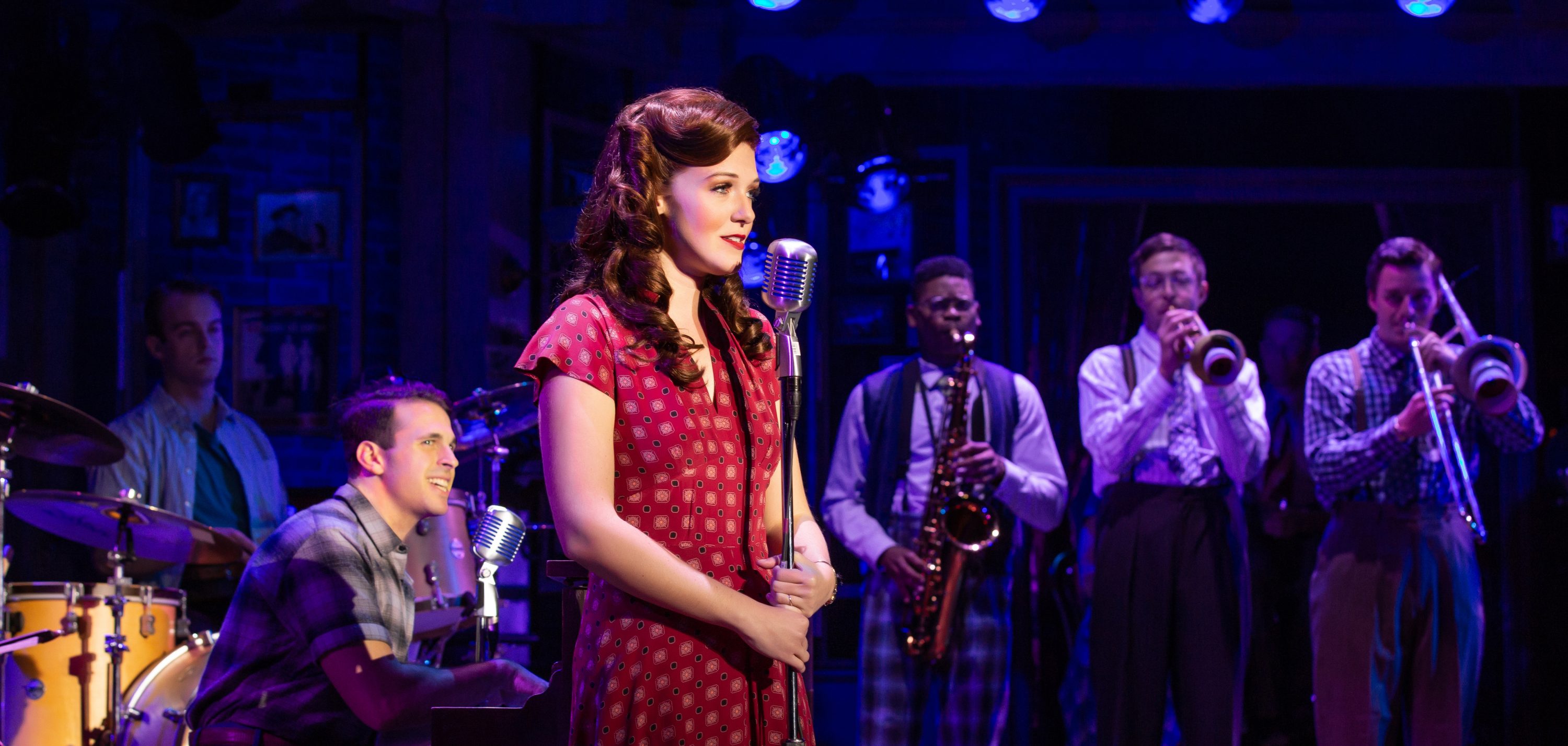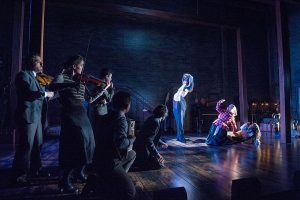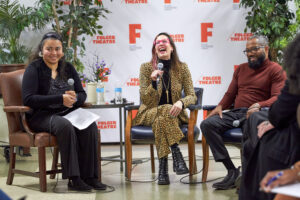As the lights dim on the elaborately crafted nightclub for the show’s opening, a jarring flash of white light jolts the audience awake. An ensemble of soldiers stands onstage, their dark silhouettes illuminated through the lights and fog. They are running from the gunshots, fighting for their lives. But this sequence quickly fades, and life dissolves into life as it was in 1945, the nightclub opening for yet another lively night.
Bandstand, the Tony-award winning musical currently touring at the National Theatre, attempts to explore this dichotomy between memories of the past and reintegration into society, between the horrors of war and the glamorization of the American soldier. With striking light design by Jeff Croiter and moving performances by its lead actors, the show resonates with the sympathies of the audience, meaningfully evoking the images it seeks to evoke. However, these images remain only images; any further exploration of theme is rendered impossible as Bandstand falls victim to its own lack of ingenuity in its script and music.
Bandstand is the story of World War II veteran Donny Novitski (Zack Zaromatidis). Plagued by the memory of his best friend, Matthew, who was mistakenly killed in a friendly fire incident, he comes home to a Cleveland that romanticizes his sacrifice but brushes over his trauma. Desperate to return to his former life and shake off his years at war, Donny throws himself into winning a radio competition, assembling a band of five veterans to compete in New York for the promise of fame and fortune. After recruiting gifted vocalist, and Matthew’s wife, Julia Trojan (Jennifer Elizabeth Smith), the show follows the Donny Nova Band in its attempts to crawl its way to success in the face of both societal and internalized barriers.
The first act of Bandstand proposes questions that the second one answers, as a confusing set of intermittent war flashbacks eventually lends itself to a heart-rending discussion of death and blame. The first act is quite rushed and perhaps a little too joyful for a show that constantly reminds its audience of the characters’ underlying mental health issues, but the second act, at least in its first parts, leans into the heaviness of the issues at hand. With a fantastic confrontation scene regarding Matthew’s death between Donny and Julia and a heart-wrenching number from Julia’s mom (Roxy York), the second act moves from merely throwing around WWII as imagery to truly leaning into its stakes. The musical is often guilty of skimming over moments that could be deep, intense scenes, but despite its uneven pacing and overuse of cliches, it has its moments.
True to the times, the music offers a lively set of up-tempo swing pieces. While most of these are nothing special, there are a few stand-out moments, most specifically the absolutely gorgeous “Love Will Come and Find Me Again,” made all the more beautiful by Smith’s crisp soprano, and the haunting finale piece “Welcome Home.” The true delight with the music throughout most of the show, however, is not through the songs themselves, but in the members of the band, each of whom plays their instrument live on stage. Many of these band members are musicians, not actors, by craft; their comedic yet sympathetic performances coupled with their musical gifts are truly impressive to watch.
The main cast, largely comprised of young, up-and-coming actors, is supremely talented; the marvelous performances of the two lead actors elevate the show from its lackluster script. Zaromatidis delivers in portraying both the naive hopefulness and deeply rooted trauma of Donny Novitksi, as he navigates returning home from the war. His masterful ability to lean into joy and optimism while still suffering under the burden of a painful history he is all too aware of captivates the audience. When he finally reaches his breaking point, the audience is entranced and horrified, a reaction only accomplished through an ability to foster a true connection between the audience and the character.
Smith similarly strikes a lovely balance between grief, sorrow, and optimism for the future in her performance as Julia Trojan. She is fierce and uncompromising, but kind and open-hearted at the same time. Her happy front as she mourns the loss of her husband is heartbreaking to watch but allows for true elation for the audience when she finds her joy once again. Smith’s captivating performance is bolstered by her smooth, striking voice. It is wonderful to watch her act, but all the more exciting to watch her walk up to the bandstand, take the mic, and sing. These are the moments we understand what made listeners in the world of the play fall in love with the Donny Nova Band; in the audience, we do the same.
Roxy York’s performance as Julia’s mother June Adams is another standout. Her comedic moments in the first half of the show stand out as some of the most enjoyable of the act, and her solo number in the second act, “Everything Happens,” is truly gut-wrenching. The ability to garner the largest laughs and some of the biggest heartbreaks of the show is no easy feat, but York makes it look simple.
The final truly special element of the show is the extraordinary light design, which transforms the elaborate but rigid set into the plethora of places the show requires. A nightclub, a home, a cityscape, and a church, through brilliant decisions, the audience is seldom confused where a scene is taking place, even as the set pieces leave the location of the scene somewhat ambiguous. The clear standout moments, however, are in the war flashbacks, where vivid beams of white light startle the audience by contrasting the warm-colored washes off most of the show. In Bandstand, the lights often tell the story as much as the show itself; these choices in conveying that story elevate the design from simply smart to beautifully artistic.
The cast and design teams work tirelessly to deliver a captivating production, and their efforts show and sparkle. But sadly, a show is ultimately only as good as the script it follows. Whether Bandstand hopes to be innovative is anyone’s guess, but its insistence on adhering to musical theater plot tropes, unfortunately, places it in the box of mere entertainment rather than true thought-provoking art. The show, however, promises a feel-good evening at the theater and a wonderful homage to the period it is set in. If this is its only goal, it delivers it with flying colors.
Bandstand will play at the National Theatre through March 8.




